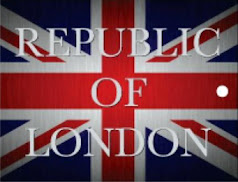The USPTO refused registration of the mark REPUBLIC OF LONDON (in standard character form) for shirts, pants, and other clothing items, deeming the mark to be primarily geographically deceptively misdescriptive under Section 2(e)(3). There was no question that London is a generally known geographic location, and Applicant Jonathan Sibony acknowledged that the goods do not originate in London. But considering the mark as a whole, is its primary significance a geographic place? How do you think this appeal came out? In re Jonathan Sibony, Serial No. 86293054 (October 14, 2021) [precedential] (Opinion by Judge Jonathan Hudis).
Applicant's specimen of use
In order to support a Section 2(e)(3) refusal, the USPTO must prove that:
(1) the primary significance of the mark is a generally known geographic place or location;
(2) the goods for which applicant seeks registration do not originate in the geographic place identified in the mark;
(3) purchasers would be likely to make a goods-place association; that is, purchasers would be likely to believe that the goods originate in the geographic place identified in the mark; and
(4) the misrepresentation regarding the geographic origin of the goods would be a material factor for a significant portion of the relevant consumers deciding whether to buy the goods in question.
Applicant Sibony maintained that the first prong of the test was not met: the primary significance of the mark is not a generally known geographic location. because "there is no such place as the 'Republic of London.'" The examining attorney conceded that "REPUBLIC OF LONDON, literally, is fictitious."
Third-party registrations for marks containing the word "LONDON," submitted by the examining attorney and by the applicant, were of little relevance. In any event, the Board pointed out once again that each case must be decided on its own record.
The Board reviewed several prior decisions and found the mark in this case to be like PARIS BEACH CLUB and MT. RAINIER THE MOUNTAIN OF SEATTLE ESPRESSO & MILK & Design. All three marks contain "additional textual matter taking the mark outside the prohibition of Trademark Act Section 2(e)(3)."
In the final analysis, . . . the Examining Attorney submitted sufficient evidence that London is a generally known geographic place or location known for fashion and apparel manufacture. However, neither "LONDON" nor "the city of London" is the mark at issue. Rather, based on the evidence of record and the applicable authorities, REPUBLIC OF LONDON is a phrase referencing a fictitious place that does not exist, and the addition of "REPUBLIC OF" to "LONDON" shifts the primary significance of the mark away from LONDON proper. Applicant's mark thus falls outside of the restrictions of Trademark Act Section 2(e)(3).
And so, the Board reversed the refusal to register.
Read comments and post your comment here.
TTABlogger comment: Looking at applicant's specimen of use (a hangtag), what do think?
The content of this article is intended to provide a general guide to the subject matter. Specialist advice should be sought about your specific circumstances.


